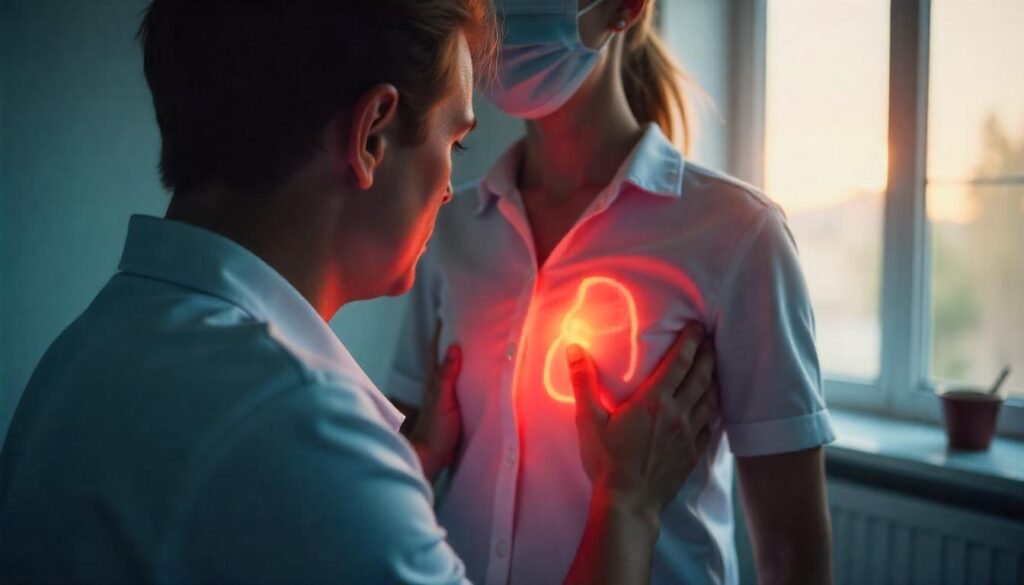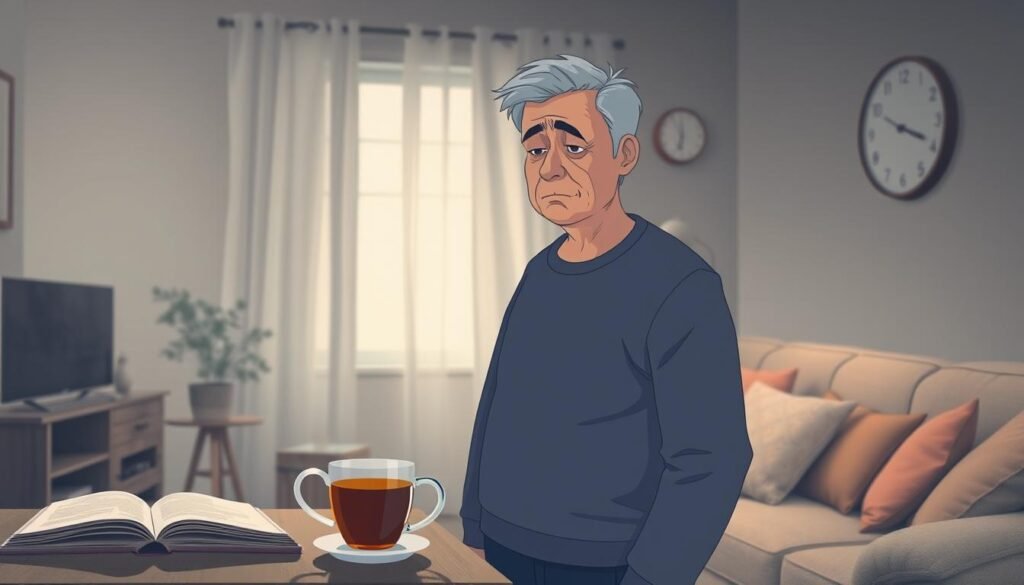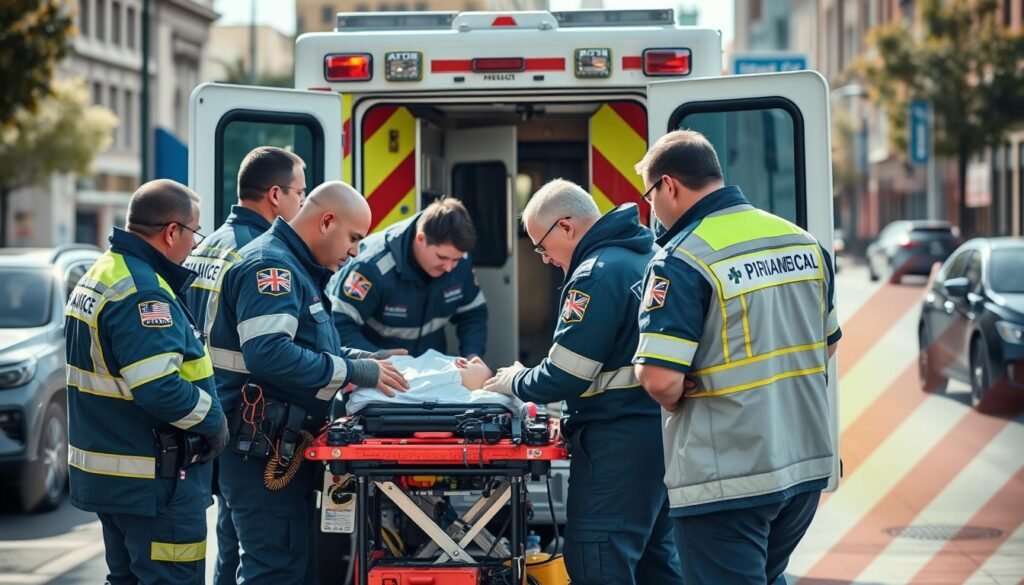Heart health is crucial, and time is everything. Knowing the early signs of heart attack can save lives. But do you know what to look for? Are you aware of the subtle symptoms that could signal a serious heart issue?
Heart attacks don’t always show up like in the movies. Many people experience more subtle signs that something is wrong. By knowing these early warning signs, you could save your life or someone you love.

Table of Contents
Key Takeaways
- Recognizing the early signs of a heart attack can be a matter of life and death.
- Heart attack symptoms don’t always fit the dramatic stereotype.
- Subtle signs like chest discomfort, shortness of breath, and upper body pain can indicate a cardiovascular emergency.
- Paying attention to these warning signals and seeking immediate medical attention is crucial.
- Understanding the unique symptoms in men and women can help identify a heart attack early.
Understanding Heart Attacks and Their Impact on Health
Heart attacks are a serious medical emergency. They happen when the blood supply to the heart is suddenly blocked, often by a blood clot. This can cause permanent damage to the heart muscle if not treated quickly.
It’s important to understand what happens during a heart attack and the risk factors. This knowledge helps with early detection and effective management.
What Happens During a Heart Attack
During a heart attack, the coronary arteries that supply blood to the heart become blocked. This is usually by a blood clot or buildup of plaque. It stops oxygen-rich blood from reaching the heart muscle, causing it to start dying.
The damage depends on the size of the affected area and how long the blockage lasts. Quick medical help is key to restore blood flow and lessen long-term damage.
Risk Factors and Statistics
Many factors can raise the risk of a heart attack. These include high blood pressure, high cholesterol, diabetes, obesity, smoking, and a sedentary lifestyle. The Centers for Disease Control and Prevention (CDC) says heart disease is the top cause of death in the U.S. It’s responsible for over 650,000 deaths each year.
Why Early Detection Matters
Early detection of heart attack symptoms is key to better survival rates and less damage to the heart. Quick medical attention can prevent further problems and boost recovery chances. Knowing the warning signs and acting fast can greatly improve survival and health outcomes.
Common Signs of Heart Attack to Never Ignore
It’s vital to spot the early symptoms of heart attack to get quick medical help. Chest pain is a known symptom, but there are others you shouldn’t ignore. Knowing all the signs can help you act fast and improve your chances of recovery.
Chest pain or discomfort is a common symptoms of a heart attack. You might feel a heavy, tight, or squeezing feeling in your chest. This pain can spread to your left arm or shoulder.
- Shortness of breath is another key indicator, as the heart struggles to pump blood effectively during a heart attack.
- Pain or discomfort in the arm or shoulder is also a common sign, as the pain can sometimes radiate from the chest to these areas.
Not all heart attacks show classic chest pain. Some people, especially women, might feel nausea, fatigue, or a general feeling of discomfort. It’s important to watch for any unusual or ongoing symptoms, as early treatment can greatly improve outcomes.
“Ignoring the signs of a heart attack can have devastating consequences. If you experience any of these warning signs, don’t hesitate to seek medical attention immediately.”
If you or someone you know is showing symptoms of a heart attack, call emergency services right away. Quick medical care can be life-saving and help avoid long-term health issues.
Chest Pain and Discomfort: The Primary Warning Signal
Chest pain is often seen as the main symptoms of heart attack. But, how people feel chest pain can be very different. It’s important to know the different kinds and when to act fast.
Different Types of Chest Pain
Heart attack-related chest pain can feel many ways. Some feel a tight, crushing feeling. Others say it’s heavy, aching, or burning. The pain might spread to the arms, neck, jaw, or back, and can be mild or very bad.
When to Seek Immediate Medical Attention for Chest Pain
Chest pain can be a frightening experience, and it’s crucial to understand when it warrants immediate medical attention. Here are some situations where you should call emergency services or go to the nearest hospital right away:
- Sudden, Severe Chest Pain: This includes any chest pain that comes on suddenly and is intense, such as a crushing, squeezing, or heavy feeling in the chest. It may feel like someone is sitting on your chest.
- Prolonged Chest Pain: Any chest pain that lasts more than a few minutes or keeps coming back should be evaluated by a medical professional. Even if the pain seems to subside, it’s essential to rule out any underlying heart problems.
- Chest Pain with Other Symptoms: If your chest pain is accompanied by any of the following symptoms, seek immediate medical help:
- Shortness of breath: Difficulty breathing, feeling breathless, or gasping for air.
- Sweating: Excessive sweating, even if you’re not exerting yourself.
- Nausea or Vomiting: Feeling sick to your stomach or actually vomiting.
- Lightheadedness or Dizziness: Feeling faint or losing your balance.
- Jaw, Neck, or Arm Pain: Pain radiating to the jaw, neck, left arm, or back.
- Confusion or Weakness: Feeling disoriented or experiencing sudden weakness.
Remember: These are just some of the situations that warrant immediate medical attention for chest pain. If you’re ever unsure whether or not to seek help, it’s always best to err on the side of caution and contact emergency services. Early intervention can significantly improve outcomes for serious conditions like heart attacks.
Disclaimer: This information is for general knowledge and informational purposes only. It does not constitute medical advice. Always consult with a qualified healthcare professional for any health concerns or before making any decisions regarding your health.
If you or someone you know has these symptoms, call for emergency help right away. Quick action can save lives during a heart attack.
Distinguishing Heart Attack Pain from Other Conditions
Chest pain can also mean other health issues, like indigestion, muscle strain, or lung problems. But, it’s always better to think chest pain might be a heart attack until checked. Getting medical help is the best way to find out what’s wrong and get the right treatment.
| Symptom | Heart Attack | Indigestion | Muscle Strain |
|---|---|---|---|
| Chest Pain | Tight, crushing, or heavy | Burning or discomfort | Aching or sharp |
| Radiation of Pain | Arms, neck, jaw, back | Rarely radiates | Localized to the affected area |
| Associated Symptoms | Shortness of breath, sweating, nausea, light-headeness | Indigestion, heartburn | Tenderness to touch |
Upper Body Pain and Related Symptoms
Pain in the arm or shoulder is a key symptoms of a heart attack. It often comes with nausea, vomiting, and a lot of sweating. Knowing these symptoms can help people get help fast.
A heart attack often starts with sharp pain in the chest that spreads to the left arm or shoulder. This pain can feel like a tight squeeze or a dull ache. It gets worse when you move or feel stressed.
People might also feel sick to their stomach or throw up. They might sweat a lot too. These signs mean the heart might not be getting enough blood, causing pain and discomfort.
| Symptom | Description |
|---|---|
| Pain in arm or shoulder | Sudden, intense pain radiating from the chest to the left arm or shoulder, often feeling like a crushing, squeezing, or aching sensation |
| Nausea or vomiting | Feelings of queasiness or the inability to keep food down, which can be a sign of inadequate blood flow to the heart |
| Sweating | Excessive, profuse sweating that may occur due to the body’s stress response to the heart’s distress |
It’s important to notice these pain and symptom signs. Ignoring them can be very dangerous. A heart attack needs quick treatment to avoid serious harm. Knowing these signs helps protect your health.
Breathing Difficulties and Cardiovascular Distress
Chest pain is a common sign of a heart attack. But, shortness of breath and other breathing issues can also signal trouble. Paying attention to how you breathe and any other symptoms can help you spot heart problems early. This way, you can get medical help fast.
Types of Breathing Problems
When someone has a heart attack, they might have trouble breathing. This can include:
- Shortness of breath, or a feeling of being unable to take a deep breath
- Rapid or shallow breathing
- Labored or difficult breathing
- Feelings of breathlessness, even at rest
Associated Symptoms with Shortness of Breath
Shortness of breath during a heart attack often comes with other symptoms. These can be:
- Chest discomfort or pain
- Sweating
- Nausea or vomiting
- Lightheadedness or dizziness
- Fatigue or lack of energy
When to Seek Emergency Care
If you or someone you know has sudden or unexplained shortness of breath, get help right away. This is especially true if you have other signs of cardiovascular distress. Quick action can save lives during a heart attack.
Silent Symptoms: Lesser-Known Warning Signs
Heart attacks often show classic signs like chest pain and shortness of breath. But, there are also “silent” symptoms that can signal a heart emergency. These include fatigue, light-headedness, and rapid heartbeat. These signs are easy to miss, but they’re crucial for those at risk of heart disease.
Fatigue can be a sign of a heart attack. It happens when the heart can’t pump blood well, making you feel very tired. If you’re always tired, even after resting, get medical help right away.
Light-headedness is another warning sign. It feels like you’re dizzy or unsteady. This happens when the heart can’t send enough blood to the brain, causing you to feel like you might pass out.
A rapid heartbeat is also a silent symptom. It means your heart is working hard to make up for the lack of blood flow. If your heart beats fast or irregularly, don’t ignore it. Get medical help fast.
Spotting these subtle signs early can save lives. If you or someone you know shows any of these symptoms, call for medical help right away.

| Symptom | Description | Significance |
|---|---|---|
| Fatigue | Persistent, unexplained exhaustion | Indicates the heart’s inability to pump blood efficiently |
| Light-headedness | Dizziness or unsteadiness | Caused by reduced blood flow to the brain |
| Rapid heartbeat | Palpitations or fluttering heart | The heart is working overtime to compensate for reduced blood flow |
Gender-Specific Heart Attack Symptoms
Heart attacks show different symptoms in men and women. Knowing these differences is key to catching them early and getting help fast.
Women’s Unique Warning Signs
Women often have less obvious symptoms during a heart attack. While chest pain is common, women might also feel:
- Nausea or vomiting
- Fatigue or extreme tiredness
- Shortness of breath
- Lightheadedness or dizziness
- Back, neck, or jaw pain
Men’s Common Symptoms
Men usually have more typical heart attack symptoms. These include:
- Intense chest pain or discomfort
- Radiating pain in the left arm or shoulder
- Sweating and cold, clammy skin
- Shortness of breath
- Nausea or vomiting
Understanding the Differences
Heart attack symptoms differ by gender due to many factors. Hormones, health conditions, and how the body reacts play a role. Knowing these differences helps people spot warning signs early. This can save lives.
| Symptom | Women | Men |
|---|---|---|
| Chest Pain | More likely to experience atypical or subtle chest pain | More likely to experience intense, central chest pain |
| Shortness of Breath | Common symptom | Common symptom |
| Nausea or Vomiting | More common | Less common |
| Fatigue | More likely to experience extreme tiredness | Less common |
| Radiating Pain | More likely to experience pain in the back, neck, or jaw | More likely to experience pain in the left arm or shoulder |
Knowing the unique symptoms of heart attacks in men and women is crucial. It helps in getting a quick diagnosis and treatment. Being aware of these differences can save lives by encouraging prompt medical action.
Emergency Response and Immediate Actions
In case of a suspected heart attack, quick action is key. Acting fast can save a life. It’s vital to respond quickly and correctly to help the person.
First, call emergency services right away. Dial 911 or your local emergency number. This will send help quickly. Stay calm and give the dispatcher all the details.
- If the person is not awake, start cardiopulmonary resuscitation (CPR). Do chest compressions and rescue breaths until help arrives.
- If they can talk, tell them to take an aspirin. This can help their heart by thinning the blood.
- Make sure they’re not too tight. Loosen belts or collars to help them breathe better.
- If they have nitroglycerin, help them take it as they’re told.
While waiting, keep an eye on their breathing and pulse. Be ready to do more if needed. Staying calm and following these steps can greatly improve their chances.

| Immediate Action | Purpose |
|---|---|
| Call 911 or emergency number | Dispatch medical personnel to the scene |
| Perform CPR if unconscious | Maintain blood and oxygen flow |
| Administer aspirin if conscious | Thin the blood and improve blood flow |
| Loosen tight clothing | Facilitate breathing and comfort the individual |
| Assist with nitroglycerin if prescribed | Help relieve chest pain and improve blood flow |
Knowing how to act fast in a heart attack can save lives. It’s crucial to respond quickly and correctly. This can greatly improve the person’s chances of survival.
Conclusion
When a heart attack happens, knowing the signs and getting help fast is crucial. We’ve looked at symptoms like chest pain and breathing issues. Finding these early can lead to better treatment and outcomes.
If you see any symptom of a heart attack, call for help right away. Don’t wait, as every minute counts. Your heart’s health is very important, and acting fast can save lives.
If you see any symptom of a heart attack, call for help right away. Don’t wait, as every minute counts. Your heart’s health is very important, and acting fast can save lives.
Knowing the signs of a heart attack helps everyone stay safe. It’s about being ready and quick to help in emergencies. Together, we can lower the harm from heart attacks and get people the care they need quickly.
FAQs Regarding Signs of a Heart Attack
What are the most common signs of a heart attack?
- Chest pain: This is the most common symptom and can feel like pressure, tightness, squeezing, or aching in the chest. It may feel like someone is sitting on your chest.
- Pain in other parts of the body: Pain can spread to the arms (usually the left), jaw, neck, back, or stomach.
- Shortness of breath: Difficulty breathing, feeling breathless, or gasping for air.
- Sweating: Excessive sweating, even if you’re not exerting yourself.
- Nausea or vomiting: Feeling sick to your stomach or actually vomiting.
- Lightheadedness or dizziness: Feeling faint or losing your balance.
- Weakness: Sudden weakness or fatigue.
Can women experience different heart attack symptoms than men?
Yes, women may experience different or less typical symptoms of a heart attack than men. These can include:
- Shortness of breath: This is often the first or only symptom for women.
- Fatigue: Unusual tiredness or weakness.
- Sleep disturbances: Difficulty sleeping or waking up frequently during the night.
- Back, jaw, or neck pain: Pain in these areas instead of or in addition to chest pain.
- Nausea, vomiting, or lightheadedness: These symptoms may be more prominent in women.
What should I do if I think I’m having a heart attack?
If you suspect you or someone else is having a heart attack, call emergency services immediately. Do not attempt to drive yourself to the hospital. While waiting for help to arrive:
- Chew aspirin: If your doctor has advised you to take aspirin in case of a heart attack, chew one 325-milligram tablet.
- Rest: Lie down and rest comfortably.
- Do not eat or drink anything.
Can heart attacks be prevented?
Yes, many heart attacks can be prevented by:
- Maintaining a healthy lifestyle: Eating a balanced diet, exercising regularly, and maintaining a healthy weight.
- Quitting smoking: Smoking significantly increases the risk of heart attack.
- Managing risk factors: Controlling high blood pressure, high cholesterol, and diabetes.



